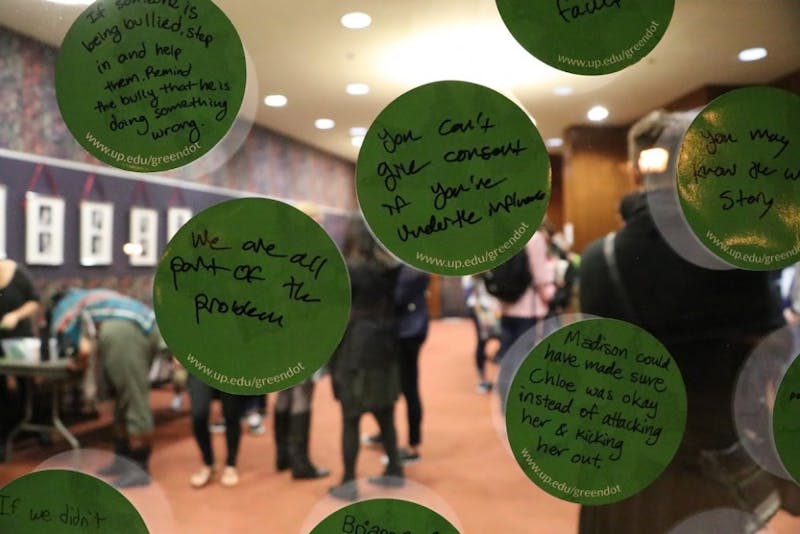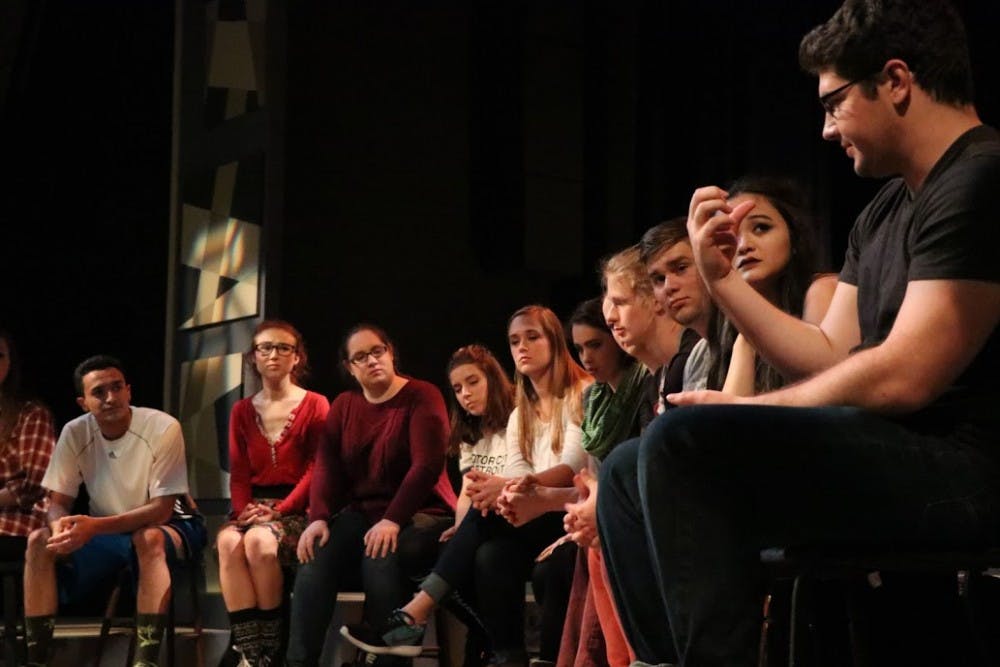At 6:55 Thursday night, the lobby of the Mago Hunt Theater began to fill up.
By 7:05, Stage Manager and junior Marcy Melville and Director Mead Hunter decided to open the doors to the theater 10 minutes early because the lobby was becoming too crowded.
When 7:30 rolled around and “Good Kids” was about to begin, there was still a steady stream of people coming in.
“When you do this kind of thing, you just kind of hope that people show up,” Hunter, who is a theatre professor, said.
And people did show up. There was nearly a full house when the play began, and roughly half of the audience stuck around for the panel discussion afterwards.
“Good Kids,” written by Naomi Iizuka, is based on the Steubenville rape case. At Steubenville High School in Ohio in 2012, a group of football players raped a clearly unconscious 16-year old woman named Chloe and live-Tweeted the assault, including photos and a video that was uploaded on YouTube.
The panel following the play included the entire cast of “Good Kids,” and Green Dot Coordinator Tiger Simpson moderated the discussion. Audience members were invited to ask the cast any questions they had, whether about rape culture more generally, the events of the Steubenville rape case, or how the actors were able to take on these roles dealing with difficult topics.
Simpson prefaced discussion by explaining how the events that take place in “Good Kids” could have been avoided if any one of the characters had chosen to do something differently. This could have been any action, from making sure that Chloe got home safely to saying something to stop or distract the boys who sexually assaulted her.
Senior Abby Neirnyck, who plays Kylie, Chloe’s cousin and an aspiring popular mean girl, echoed this statement as the actors discussed the roles their characters played in the assault.

“No one is completely blameless in any way,” Neirnyck said.
The actors each discussed the responsibility their characters had in the situation, and discussed what they would have done differently if they were placed in the situation in real life.
Beyond this, Simpson and the actors expressed the need to start a larger conversation about sexual assault and rape culture on campus, starting with events like “Good Kids” and the panel discussing its content afterward. Simpson, who is new to UP this year, also recently participated in the screening and discussion of “Hunting Ground,” a documentary about sexual assault on college campuses.
Right after the performance ended, audience members were talking and pulling out their phones to tell others about what they just saw.
Sophomore Maclean Ankhelyi said he had no idea what the show was about before it began, so the content was a surprise.
“The acting was fantastic,” Ankhelyi said. “It made me feel terribly uncomfortable as a guy, but it was really well done.”
Freshman Pia Fornell wanted to see the performance, but was unable to, so she came to the panel afterward to hear what was being said.
“High school never prepared me for what (the rape culture) would be like on a college campus,” Fornell said.
Fornell started a “consent culture political action group” at her Lake Oswego high school, where they held forums and made provocative art to draw attention to this important subject. She said she felt the show and panel were successful in representing rape culture — showing both victims and perpetrators as multi-dimensional human beings.

Near the exit of the theatre, there was a table filled with Green Dot stickers and permanent markers where audience members were encouraged to write something they could have done to prevent the rape depicted in the play.
Senior Adele Kennedy, who is the dramaturg behind “Good Kids,” ran the table, and was in charge of taping these stickers to the door as part of a larger artistic display.
The dramaturg’s job in a production is to research and know what is appropriate for that production, like whether set pieces are from the right time period, and ensuring that actors and technicians are aware the context of the production. Kennedy worked with Director Mead Hunter and the actors to educate them about what happened in Steubenville, as well as to make them aware that this show is not intended to be a carbon copy of that particular case, but to have a wider message about what rape culture is and how people contribute to that culture. Hunter and Kennedy felt that if “Good Kids” was focused solely on Steubenville, audiences would leave upset about an awful thing that happened, instead of feeling encouraged to have these important conversations.
“We don’t want people to leave feeling defeated,” Kennedy said.
--
If you go: The show will run Saturday at 7:30 p.m. and Sunday at 2 p.m.
Editor's Note: Content of the show may be graphic.








